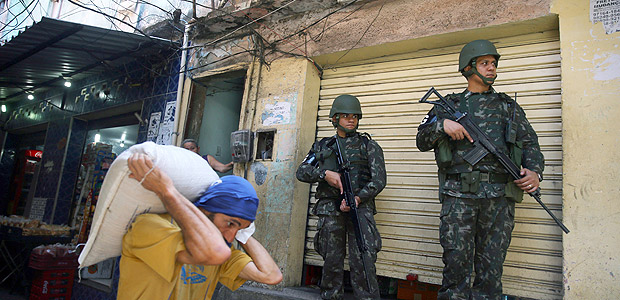Latest Photo Galleries
Brazilian Markets
12h03 Bovespa |
-0,14% | 129.028 |
16h43 Gold |
0,00% | 117 |
12h17 Dollar |
+0,39% | 5,0873 |
16h30 Euro |
+0,49% | 2,65250 |
ADVERTISING
Military Courts Given Jurisdiction Over Crimes Against Civilians During Armed Forces Operations
10/17/2017 - 10h14
Advertising
RUBENS VALENTE
FROM BRASÍLIA
President Michel Temer approved a bill sent to him by Congress that transfers to the Military Judiciary cases of serious crimes involving the lives of civilians committed by military members during their operational activities.
An example of this kind of activity is a GLO (Guarantee of Law and Order), like the operations currently underway in communities in Rio de Janeiro.
The law goes into effect immediately. This transfer of jurisdiction of cases, which have been tried by jury courts in the common judicial system based on a law from 1996, is the subject of criticism of non-governmental organizations (NGOs) as well as the Prosecutor General's Office.
For Amnesty International, an NGO, the Armed Forces have already demonstrated, and in the recent past, that they don't prioritize the rigorous investigation of crimes by their own members - innumerous cases of torture, killings and forced disappearances of opposition members against the military dictatorship (1964-1985) continue until today unpunished by the Armed Forces.
In a statement, the Minister of Defense wrote that "a [civil] jury trial does not present the most adequate forum for the judgment of an act committed by a military member of the Armed Forces during the performance of a military operation".
He argued further: "A military member of the Armed Forces doesn't act as a private citizen, but as the State itself, under its supreme power, and deserves to be judged by a specialized judiciary".
SUPPORT
According to a public-opinion poll published by the Pew Research Center of the United States on Monday (the 16th), 23% of Brazilian respondents said that they didn't approve of representative democracy and said that they supported at least one of three different forms of government: technocratic, military or one with a "strong leader".
In the 38 countries where the poll was conducted, the average was 13%, with 23% saying that they ruled out of any form of government that was "non-democratic".
Translated by LLOYD HARDER
Read the article in the original language
| Pilar Olivares/Reuters | ||
 |
||
| Members of the armed forces patrol the Rocinha slum during an operation against drug gangs in Rio de Janeiro |



